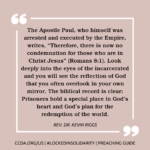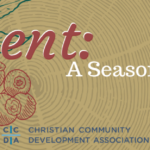Over the past few months, I’ve been having an on-off conversation with my dear friend Katrina, who gave me permission to include some of her reflections here.
For several years, Katrina had been confronted by a painfully unanswered prayer – the kind of unanswered prayer that disorients you. It can make you wonder if you heard God or if God hears you. It can bring on that “dreams deferred” heartsickness and drive you to daily and desperately profess that God still sees you. An unanswered prayer can forever shape identity and, if you’re not careful, might even twist you.
Those many years of unanswered prayer took her to that unsettled and unsettling place called the wilderness.
I believe there is a special grace for people in the wilderness. A special way of God providing. When you’re not in the wilderness, you know where to go to look for food. You have church. You have your worship groove. But then, in the wilderness, you need a new way to survive because the prayer you’ve always prayed isn’t doing it, the song you’ve always sung isn’t hitting it, the sermons aren’t pulling you up… the traditional ways of feeding [you] aren’t feeding [you]
So she learned how to trust God to drop daily bread into her lap so that she could survive. This went on for years, so much so that the wilderness became the “new normal.”
“When you learn to access God in these difficult places, it’s almost easier to just stay there.”
But then one day, God answered her prayer. And Katrina found that she had been in the wilderness for so long that she had forgotten how to live in the abundant place.
“Personally, I never heard the message of what to do when you actually get out of the wilderness. You’ve been in the struggle for so long that you adapt to it but the survival skills that you develop in the wilderness aren’t applicable outside the wilderness.”
In this Advent season of waiting and preparation, how do we prepare ourselves to come out of the wilderness even while we’re still struggling to survive in the wilderness?
How do we prepare and “make way” for a future terrain with Jesus even while He walks us through an uncharted, unsettled, and unsettling territory filled with wild things?
Isaiah 35 beautifully envisions the joy of a people and creation no longer groaning. Glad land. Wilderness blossoming like the crocus. Full of the splendor of God. Blind eyes opened. Deaf ears unstopped. The lame leaping. The mute shouting for joy. Streams in the desert. A Way of Holiness. No more wicked fools. No more lions or ravenous beasts. Only the redeemed and rescued entering Zion with singing and the crown of everlasting joy. Praise Jesus.
And yet, the litany of “will” – starting with “the parched land will be glad” and ending with “sorrow and sighing will flee away” – point clearly to a future event. This is not today, and who knows if it’s tomorrow.
How do you believe in this Isaiah 35 vision when you still lick desert-parched lips and see through sweat-stung eyes? How do you bear up under a sun so oppressively hot that it feels like a wicked hand pushing down on your burden-bent back? How do you walk with weary bones and rest when the jackals, lions, and ravenous beasts howl and prowl close by? How do you not feel chafed down by the sand, burning and gritty, sneaking into food and secreting into clothes? How do you remain convinced of the Lord’s goodness and greatness to deliver His promises when every circumstantial indicator says otherwise and sorrow and sighing seem like close friends?
How do you go on day after day, week after week, month after month, generation after generation and still believe that the Lord is coming soon with water and flowers and meadows and rescue and joy? Wouldn’t it be easier to resign yourself to a faith that only believes in the God who sustains you in the desert rather than believing in the God who will deliver you?
When we don’t know when the wilderness will end, we don’t learn how to have holy expectation about the future because we don’t want to be disappointed. And this actually weakens our future faith.
In the middle of Isaiah 35, there is a command:
3 Strengthen the feeble hands,
steady the knees that give way;
4 say to those with fearful hearts,
“Be strong, do not fear;
your God will come…
he will come to save you.”
While walking through wilderness, we need to be strengthened, steadied, and encouraged for God’s delivering answer to our prayers, for the future hope that Jesus brings. Because while we eat a wilderness diet, we might find ourselves becoming less and less fitted to live in God’s abundance.
Yes, He is the Man of Sorrows, acquainted with suffering. Yes, His mercies are new every morning. I need to know those parts of His nature walking through a dry and thirsty land. But today’s wilderness isn’t all that will be. And with all that I am, I also need to know and believe Him as the One with the mighty hand and outstretched arm, the God who saves and rights every wrong.
I think often of the saints in Hebrews 11 who wandered in deserts and mountains and caves and yet were commended for their faith to believe in what they never saw. I think often of the persistent widow in Luke 18 who continues to cry out day and night for justice, helping us to understand what it means for Jesus to find faith in us and on earth.
The timing of our deliverance from the wilderness is the Lord’s prerogative alone. Our only consideration is to answer the question: will the son of Man, our Emmanuel, our Jesus the Coming one, will He find faith on earth?
If during this Advent season you find yourself in the wilderness, may the Lord lead you to inquire how to prepare, how to strengthen our hands to lay hold to the promise, and steady our knees to stand in the promise, and encourage our hearts to believe that Jesus will come in the fullness of His promised answer.
By Marisa L. Stubbs




